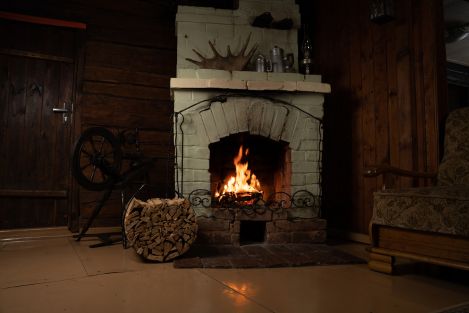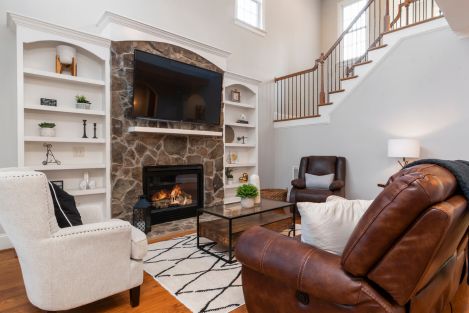
Written by Kayla Jane Barrie Updated on Nov 24, 2025 4 mins read

Fireplaces bring a sense of togetherness, especially over the holiday season. That peaceful time to come home on a snowy day and cozy up with your loved ones.
However, they do pose risks. Each year in Canada, around 24,000 house fires resulting in 377 deaths and 3,048 injuries. Can your insurer deny you coverage because of a wood or gas fireplace because of the increased risk?
Read this blog post to learn how they can impact your policy and how to be as safe as possible.
No matter how modern or new your fireplace or wood burning stove is, it will spark an increase in your home insurance because it increases the risk of a claim. The price increase depends on the insurer, the type of fireplace, and if it’s the main heating source of the property. Don't forget that if you have cottage insurance, you'll need to declare the fireplace.
Before getting coverage for a wood fireplace, you will likely be required to get a WETT inspection. Professional inspectors will ensure correct installation, building codes, and ensure it is safe to use.
If you are DIY-ing a fireplace, you may want to consider having a professional install it so all requirements are met and you can be adequately protected. Some companies will also require an annual fireplace inspection to ensure your fireplace runs at its safest capability.
Your annual costs could increase by $100 (10%) per year or more, depending on these factors. You can choose to have it lower by paying a higher deductible and ensuring you are not paying for features you don’t need. You want to be confident that your home replacement cost is correct.
Keep in mind, although gas fireplaces are less of a risk, they can still increase your coverage costs by up to 10% yearly. Modern fireplaces can lower your monthly heating bills by 20%-40%, so you could say it balances out. Always follow the manufacturer’s manual and suggested guidelines for inspections and care – your insurer may ask for this proof when they cover you for a gas fireplace.
You may think you can save money by not declaring a fireplace. Failure to inform your insurer that you have a fireplace puts you and your loved ones at risk. If you suffer a loss related to the fireplace, they can decide not to reimburse your claim and void your policy.

Along with regular maintenance and inspections, Canada Safety Council offers these tips to enjoy your fireplace safely this winter and have safe holidays:
Before you go to sleep, make sure you use a poker to spread out any remaining embers to help them cool faster. Never leave the room or house until a fire is entirely out.
Keep the damper open until the ashes have cooled down – a closed damper can cause the fire to heat up again. It should be safe to use a steel shovel to empty the ashes into a metal container the next day. Store ashes away from any structures or any combustible materials.
Yes – if you do not disclose your fireplace to your provider, they may cancel your coverage. If you have to submit a home insurance claim, they may deny you if the fireplace was not mentioned previously.
At a minimum, you should have your fireplace inspected and your chimney cleaned yearly.
You should never leave a fire burning while you sleep or leave the area. Always extinguish fires properly before going to sleep to avoid any accidents from sparks or carbon monoxide.
Gas fireplaces are safer but still pose risks and affect your premium. Always look at the pros and cons before investing and consider your lifestyle preferences. Some people don’t mind the work of a wood-burning fireplace, while others want that simplicity of gas.
Yes – gas and wood fireplaces can emit carbon monoxide. Ensure your chimney has proper ventilation, open a window a crack, and make sure the space has good airflow to limit exposure.
No matter what type of fireplace you are getting installed or currently have, make sure you understand the costs and risks associated with them. Always practice fire safety and make sure your insurer knows about your fireplace. It may be a good idea to get personal contents insurance.
| Categories | Home |
|---|---|
| Tags | Protect Your HomeHome Maintenance |
Read our insurance blog to get helpful tips, information and news.
Big changes are coming to Ontario car insurance. Starting July 1, 2026, many accident benefits will become optional. Learn how these "à la carte" reforms impact your coverage and why opting out could be a major financial risk.
Learn about Canada's new Electric Vehicle Affordability Program (EVAP). Discover how the $50,000 transaction rule works, which cars qualify, and how to claim your rebate.
Fatal collisions in Canada rose 9.14% from 2019 to 2023. Discover the latest road safety statistics, provincial rankings, and how these trends affect your auto insurance rates.
Find out if a seatbelt ticket will raise your car insurance rates and how insurers view seatbelt violations.